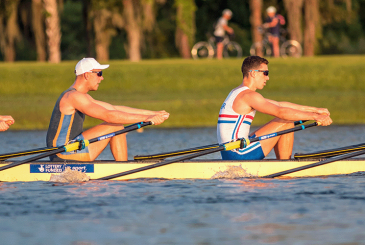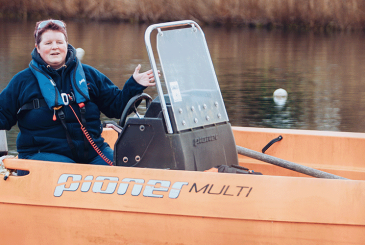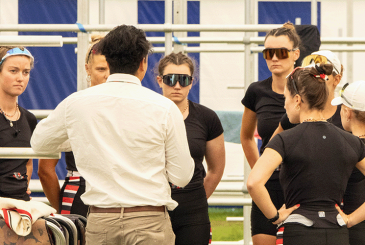After a long winter of lockdown, the rowing community is back on the water. Joanne Harris catches up with three coaches and asks them for their top tips for those early sessions
While schools have been able to offer organised sport since early March, club crews have only recently been able to start rowing back on the water, so what does this mean for coaches as they plan their sessions?
The rest of the 2021 season remains somewhat up in the air. The age-old pattern of the summer season, with the weeks marked out by the big multi-lane regattas leading up to National Schools, Henley Women’s or Henley Royal, followed by pot-hunting in the sun, will be very different this year.
The uncertainty and lockdowns will undoubtedly have an impact on how the next few weeks are approached. Everyone is impatient to be rowing again, but too much too soon, or too hard too soon, could well backfire with the risk of injuries, loss of motivation and burnout all concerns held by coaches.
“You’ve got to be quite structured about it and there are three areas to focus on,” says Carol Cornell, who coaches at Tiffin School and is a member of Walton Rowing Club.
“What has happened – the past, effectively; what you want them to do when they come back – the present; and how you’re going to manage their expectations in the future, particularly for this rowing year when we know there are going to be so many variables. Just keep it simple, because at the end of the day it’s only rowing, but it has to be done properly,” Cornell adds.
Keeping things simple and fun is crucial.
“One thing I think is really important that everybody understands is that it’s okay not to be perfect”
Greg Flower, head of rowing at Wycliffe School, says: “On that first session back and for the first couple of weeks it’s just going to be getting them back on the water, just realising why they do rowing, that it’s not all about rowing machines on Zoom and virtual circuits sessions.”
Structure your sessions
Enjoying being outside and on the water is certainly the top priority for many, but within any squad there will be a variety of aims. Some rowers will just want to go out and paddle; others will be hoping to start building towards a goal.
Florence Griffiths, who coaches at Surbiton High School in Kingston, says getting the tone right for the first few sessions will be key.

“One thing as a coach you need to be careful of when you go back is that they’re going to be behind – you’re going to want to catch up,” she explains, saying coaches and athletes alike need to consider the structure of those initial outings.
“The worst thing you could do is suddenly turn around and go ‘you all need to be quiet because we’re going to do x y and z for 45 minutes’. It’s not going to happen.
“They’re all so excited to get back and how you play it is going to be important. When you get on the water, get the serious stuff done, but find a way that doesn’t take an hour and a half,” Griffiths says.
Cornell agrees. She advises coaches to make an effort to think about their own approach for the return to the water, and spend time just watching their athletes.
“Look, listen, understand and see what they’re doing; see what their body language is telling you. Make a conscious effort to say less,” she suggests.
“Do some fundamental exercises – remind them where front stops are, remind them where back stops are, build the stroke up but do it in pairs, take it apart and keep it slow, just to make sure that they get out of the boat and they feel they’ve achieved something. It’s much better to leave them wanting more.”
Flower has adopted the same approach.
“I’ll let them paddle for half an hour. I’ll say very little, and I’ll let them get on with it. I’ll let them stop every five, 10 minutes just to discuss how they think the boat’s going, and then I’ll come in after they’ve paddled for half an hour and after muscle memory has hopefully kicked in,” he says.

Manage expectations
A challenge for many coaches will be managing the hopes and dreams of athletes starved of competition and desperate to race. Private matches will be a good way of getting some racing in in a controlled environment; Flower says this is something which Wycliffe plans to do more of.
“Let’s have a nice time, because everything else is pretty miserable”
Griffiths thinks the likely delay or postponement of the early-summer regattas gives coaches and squads a chance to break up the rulebook and do things a bit differently. She wants to make sure her rowers are engaged in the process.

“School is going to be putting a lot of pressure on the older kids especially I’m sure, so just ask them what they want to do. If that’s a session where they just row up to the top and back singing, great, do that,” she suggests.
“Our younger age groups just love to plough up and down racing, so let’s do it. Let’s do rate 302 because why not?
“Sometimes you look at them and you think, this is chaos ensuing in front of me, but they’re all smiling and that’s fine. That’s what we’re here to do. Let’s have a nice time, because everything else is pretty miserable.”
COVID-19 has brought different challenges to everyone, and coaches and rowers alike should make sure these are addressed. Understanding what each party has been through – whether that be cancelled exams, home-schooling, furlough or redundancy, illness and loss – will help build an environment where all can feel comfortable and enjoy the return to rowing without additional pressure.
Maintaining communication and encouraging openness and honesty will be key, says Cornell.
“One thing I think is really important that everybody understands is that it’s okay not to be perfect. It is really important to acknowledge that we’re not all in the best place, but let’s be honest about it and then let’s move forward,” she advises.
If everything is managed well, the return to rowing will bring a bit of normality back to our lives, with coaches and athletes alike ready to appreciate the simple joy of being able to get in a boat and go for a paddle.
“I’m really positive, I think it’s going to be a really good summer,” concludes Flower.










